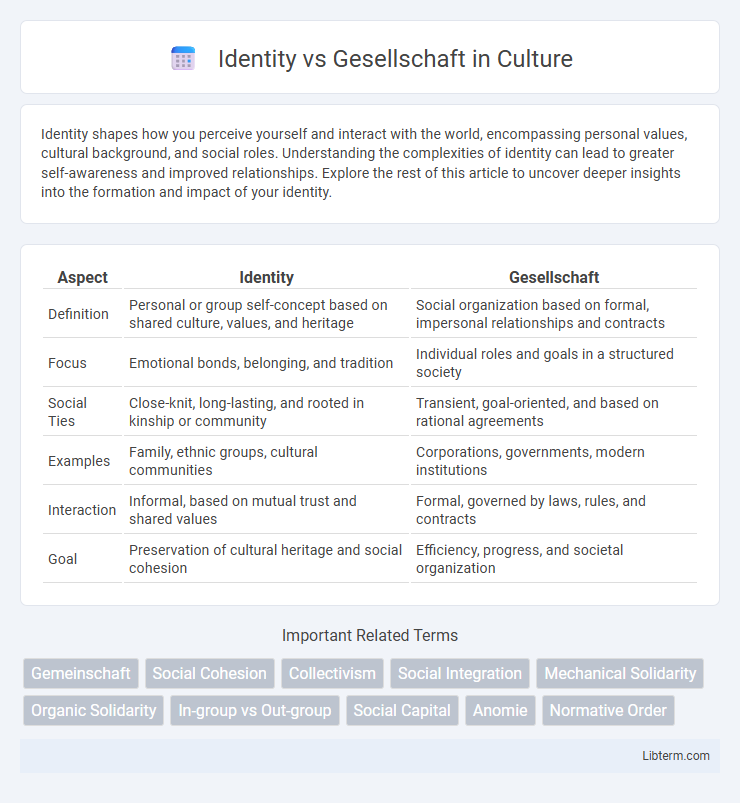Identity shapes how you perceive yourself and interact with the world, encompassing personal values, cultural background, and social roles. Understanding the complexities of identity can lead to greater self-awareness and improved relationships. Explore the rest of this article to uncover deeper insights into the formation and impact of your identity.
Table of Comparison
| Aspect | Identity | Gesellschaft |
|---|---|---|
| Definition | Personal or group self-concept based on shared culture, values, and heritage | Social organization based on formal, impersonal relationships and contracts |
| Focus | Emotional bonds, belonging, and tradition | Individual roles and goals in a structured society |
| Social Ties | Close-knit, long-lasting, and rooted in kinship or community | Transient, goal-oriented, and based on rational agreements |
| Examples | Family, ethnic groups, cultural communities | Corporations, governments, modern institutions |
| Interaction | Informal, based on mutual trust and shared values | Formal, governed by laws, rules, and contracts |
| Goal | Preservation of cultural heritage and social cohesion | Efficiency, progress, and societal organization |
Understanding Identity and Gesellschaft
Identity represents an individual's self-concept, encompassing personal beliefs, values, and experiences that shape their uniqueness within a social context. Gesellschaft refers to a type of social organization characterized by impersonal, formal relationships typical in modern urban and industrial societies, emphasizing roles and contractual obligations over emotional bonds. Understanding the dynamic between identity and Gesellschaft involves analyzing how personal identity both influences and is influenced by the structural and functional aspects of Gesellschaft, shaping social interactions and community belonging.
The Origins of Identity Theory
Erik Erikson's formulation of Identity vs Gesellschaft roots identity theory in psychoanalytic and sociological traditions, emphasizing the individual's quest for a coherent self within complex societal structures. Drawing from George Herbert Mead's symbolic interactionism, identity emerges through social interactions and the internalization of communal roles. This foundational framework highlights how personal identity develops in dynamic tension with societal expectations, shaping social behavior and self-conception.
Gesellschaft: Definition and Historical Context
Gesellschaft refers to a type of social relationship characterized by impersonal, formal, and institutional interactions typically found in modern urban societies. Rooted in Ferdinand Tonnies' sociological theory, Gesellschaft contrasts with Gemeinschaft by emphasizing individualism, contractual obligations, and economic ties rather than personal bonds. Historically, Gesellschaft emerged during industrialization and urbanization, reflecting the shift from close-knit, traditional communities to complex, bureaucratic structures shaping contemporary social organization.
Key Differences: Identity vs Gesellschaft
Identity centers on personal, intrinsic characteristics and self-concept, emphasizing individual uniqueness and psychological continuity. Gesellschaft denotes impersonal, formal relationships within large, modern societies driven by goals, roles, and social contracts rather than emotional bonds. Key differences include the subjective nature of identity versus the objective, transactional dynamics of Gesellschaft, where identity reflects internal cohesion and Gesellschaft embodies external social structure.
Social Bonds in Identity-Based Communities
Identity-based communities strengthen social bonds by fostering shared values, cultural practices, and collective experiences that shape individual and group identities. These bonds create a sense of belonging and mutual support, contrasting with Gesellschaft associations, which are more impersonal and contractual. The depth of social cohesion in identity-oriented groups enhances trust, cooperation, and emotional connection among members.
Gesellschaft and Modern Urban Life
Gesellschaft characterizes modern urban life through impersonal, formal associations driven by individual self-interest and economic transactions rather than traditional community bonds. In urban settings, social interactions are often governed by rationality and efficiency, fostering a network of contractual relationships and institutional structures. This dynamic shapes contemporary societal organization, emphasizing mobility, specialization, and social differentiation in complex cities.
The Role of Culture in Shaping Identity
Culture plays a fundamental role in shaping identity by providing shared values, norms, and symbols that define individual and collective self-understanding within Gesellschaft (society). In complex social structures, identity formation is influenced by cultural narratives and social practices that link personal experiences to broader societal frameworks. This dynamic interaction between cultural context and social organization fosters a sense of belonging and shapes how individuals perceive their roles within Gesellschaft.
Impacts of Gesellschaft on Social Relationships
Gesellschaft, characterized by impersonal and formal social ties, often weakens deep personal relationships by prioritizing individual goals and contractual interactions over emotional bonds. This shift towards rational self-interest and role-based connections can lead to increased social fragmentation and reduced community cohesion. The impact on social relationships includes a tendency toward anonymity, limited trust, and decreased social support networks.
Identity and Gesellschaft in the Digital Era
Identity in the digital era is increasingly shaped by online interactions, social media profiles, and virtual communities that redefine personal and collective self-perception. Gesellschaft, or societal relationships, evolve through digital platforms that facilitate large-scale, impersonal connections driven by shared interests or transactions rather than traditional social bonds. This shift impacts how individuals construct identity within Gesellschaft, blending personalized digital expressions with the broader, often anonymous, nature of modern social networks.
Striking a Balance: Navigating Identity and Gesellschaft
Striking a balance between identity and Gesellschaft involves harmonizing individual self-concept with societal structures and expectations. This dynamic interplay requires acknowledging personal values while adapting to communal norms to foster social cohesion and personal authenticity. Navigating this balance enables individuals to integrate meaningfully within society without compromising their unique sense of self.
Identity Infographic

 libterm.com
libterm.com